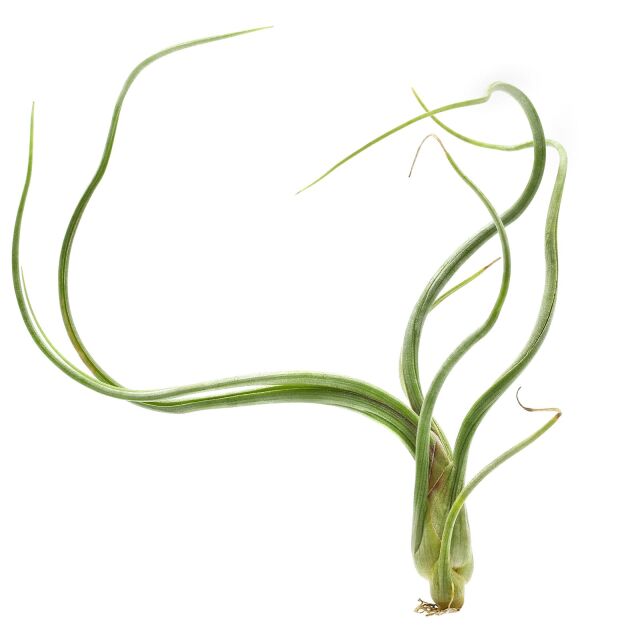Bailey's air plant





Tillandsia baileyi
Bailey's air plant
- Sprawling green Tillandsia
- Striking, bizarre appearance
- For rainforest terrariums
Item question
We’re here for you!
Please enter your question and e-mail and we’ll contact you as soon as possible. It usually takes us up to 24 hours during business days to respond.
Thank you for your question!
Thank you, we’ll get in touch!
Close window
You already sent us a question.
Please wait a few minutes
Description
Tillandsia baileyi originates from warm humid but seasonally dry areas of Guatemala, Mexico and the USA. It was first described in 1903 and named after the botanist L.H. Bailey. The hard narrow leaves grow slightly wavy upwards and the base is thickened. This growth habit and a fine cross-striped pattern on the leaves give the plant a rather bizarre appearance.
Tillandsia baileyi's native areas have wet and dry seasons, but it is one of the green or rainforest Tillandsias that prefer a more humid environment than the so-called grey Tillandsias.Nevertheless, it is an "air plant" that can absorb water and nutrients entirely via absorbent scales on the leaves. The roots serve mainly as adhesive roots. The plant can be attached to a solid base such as wood or stone. It prefers regular humidification and grows best in a bright to semi-shaded area, in daylight cultivation without direct sunlight. Watering can be done by dipping as well as by misting. After watering, the plant should be allowed to dry off. Optimally, an orchid and Tillandsia fertiliser is added every second watering during spring and summer.
After flowering, the mother plant begins to form small offspring. These can be separated carefully from a size of about one third of the mother rosette. If they are not separated, they grow together to form a larger clump.
T. baileyi stands out in any rainforest terrarium and is a real eye-catcher. Its leaves look like silvery branches in a green jungle. When the Tillandsia flowers, the blossom glows in a beautiful purple-red.
Profile
| Tillandsia baileyi | |
| Cultivation options | Epiphytic |
| Growth height | approx. 20 - 30 cm |
| Temperature | approx. 15 - 35 °C |
| Humidity | approx. 60 % |
| Light requirement | Bright to sunny; no direct sun |
| Watering | Every 2 - 3 days per spraying or once a week by dipping with calcium-free water |
| Fertilising | In spring and summer, with every second watering, orchid or Tillandsia fertiliser |
| Propagation | Formation of pups after flowering |
| Suitable for | Rainforest terrariums |
| Cultivation options |
| Epiphytic (tying on, sticking) |
| Growth height |
| approx. 20 - 30 cm |
| Temperature |
| approx. 15 - 35 °C |
| Humidity |
| approx. 60 % |
| Light requirement |
| Bright to sunny; no direct sun |
| Watering |
| Every 2 - 3 days per spraying or once a week by dipping with calcium-free water |
| Fertilising |
| In spring and summer, with every second watering, orchid or Tillandsia fertiliser |
| Propagation |
| Formation of pups after flowering |
| Suitable for |
| Rainforest terrariums |
Terrarienpflanzen
Our terrarium plants give every terrarium an individual, natural atmosphere and at the same time provide a healthy environment for all terrarium inhabitants. Our wide range of tropical, subtropical and even arid plants are easy to combine and enhance any terrascape. Whether it's strong succulents, subtle tillandsias, eye-catching neoregelias or wonderful orchids - we offer terrarium plants for different terrascapes from rainforest to desert.
General information
Please choose a variant to see more information.
| Item no. |
|
| EAN | |
| Weight | |
| Shipping weight |
Customers ask customers
You have questions about this product? Ask other customer or our support team about this product!